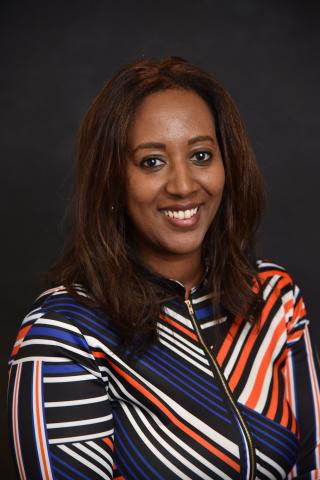Reflecting on her experience as a PhD student and now an alum, Dr. Demessie highlights the Ford School’s ability to advance a socially conscious analysis with empirical and qualitative methods.

Dr. Menna Demessie
First job out of Ford School: APSA Congressional Fellow - Rep. Barbara Lee
Publications: Her publication Congress & the Presidency Journal co-authored with Professor Errol Henderson (PhD ‘93), highlights the salience of race and ethnicity in the U.S. black population and its influence on public policy. The article entitled, “Race and Ethnicity in Black Congressional Representation: The Case of U.S. Foreign Policy Toward Africa, is now available.
As the vice president of policy research and analysis at the Congressional Black Caucus Foundation, Dr. Menna Demessie (PhD '10) strives to analyze and synthesize data and equip stakeholders with information to have constructive dialogue about racial inequalities and policy. "Data matters, and we actually have really good data that shows us why race continues to be a strong predictor of outcomes in education, employment, access to healthcare, and the list goes on," says Dr. Demessie.
Dr. Demessie’s projects are wide-ranging. She is the founder and co-managing editor of the Journal of the Center for Policy Analysis and Research (JCPAR), a multidisciplinary endeavor which brings together scholars and practitioners around issues related to black politics in the U.S. and abroad. Dr. Demessie is also working in partnership with Stacey Abrams' Fair Count census initiative. According to Dr. Demessie, the mission of Fair Count is "to increase census turnout in 2020 with a particular aim at the 'hard-to-count communities' systematically under-reported. In particular, we are targeting counties where at least 25% of the population lacks internet access and 25% of the population is a community of color. Our goal is to really cast a wider net beyond what the Census Bureau has considered a hard-to-count community to equip policymakers, community organizers, and enumerators with better data around where they should allocate their census turnout efforts."
In light of COVID-19, the census deadline has been extended to October 31, 2020. "As populations shift across the country, we understand the direct and indirect impact of redistricting and reapportionment for underrepresented communities. At the same time, we are fighting COVID-19, the double pandemic of being a person of color challenged by the disproportionate effects of infections and death. Surviving the pandemic and being undercounted is the reality of what we’re up against," said Dr. Demessie.
Dr. Demessie also focuses on workforce diversity and retention of congressional staff, providing efficient policies and procedures that enhance diversity, equity, and inclusion efforts on Capitol Hill. She emphasizes that advancing underserved communities is important for everyone and the institutions in which we work.
Dr. Demessie attributes her passion for community organizing and civic engagement to her Ethiopian parents. "I have a whole other life of volunteering and activism in the Ethiopian space including serving as an appointee of Ethiopian Prime Minister, Dr. Abiy Ahmed, on the Ethiopian Diaspora Trust Fund Advisory Council. We’ve raised $6 million dollars to date from diaspora donors across the globe for socioeconomic development in Ethiopia. So, growing up, understanding the importance of race and ethnicity in a domestic and global context helped me understand the diverse political views or perspectives on foreign policy and the ways in which we civically engage with the U.S. body politic."
Dr. Demessie also credits organizations like the National Conference of Black Political Scientists (NCOBPS)–co-founded by University of Michigan Professor Hanes Walton–for inspiring and motivating her scholar activism. "Many of the professors who study black politics share their scholarship and mentorship with others and are always contemplating how to move both the discourse forward, while actively working to create resourceful spaces of support that advance more equitable opportunities in academia for social scientists of color," said Dr. Demessie, "I see NCOBPS as the academic wing of the black power movement. While civil rights activists like John Lewis were on the streets protesting for justice, their academic counterparts were waging an intellectual war in research, scholarship, and teaching to fight systemic discrimination in academia. The organization and its members have been critical in my success in graduate school and beyond."
Dr. Demessie credits the Ford School’s dynamism, and particularly the school’s strengths in communication, data, and policy analysis with shaping her path, "My dissertation topic, (which focused on the CBC and other racial and ethnic caucuses and examined how effective they were in achieving their policy goals) would not have been possible without the cutting-edge faculty leadership at the Ford School like Mary Corcoran and others. University of Michigan teaches you to be confident and innovative with creating models to analytically look at the ways our political system is shifting and changing to better represent its constituents."
Currently serving her sixth and final year on the Ford School Alumni Board, she says, "Reflecting on my experience as a PhD student and now an alum, I value that much more the Ford School’s ability to advance socially conscious analysis with empirical and qualitative methods – that kind of coupling not only changes minds, but has the power to change lives.